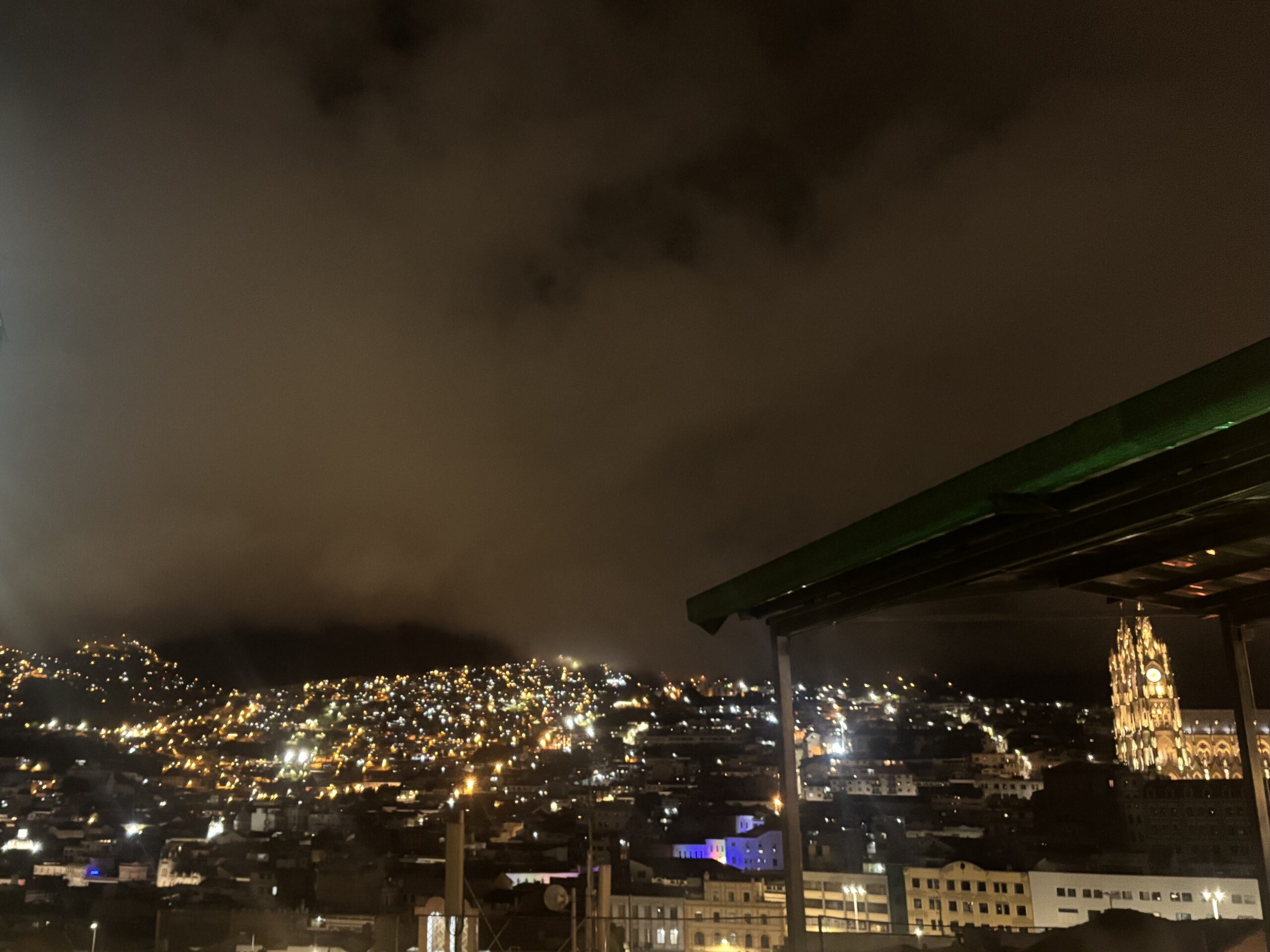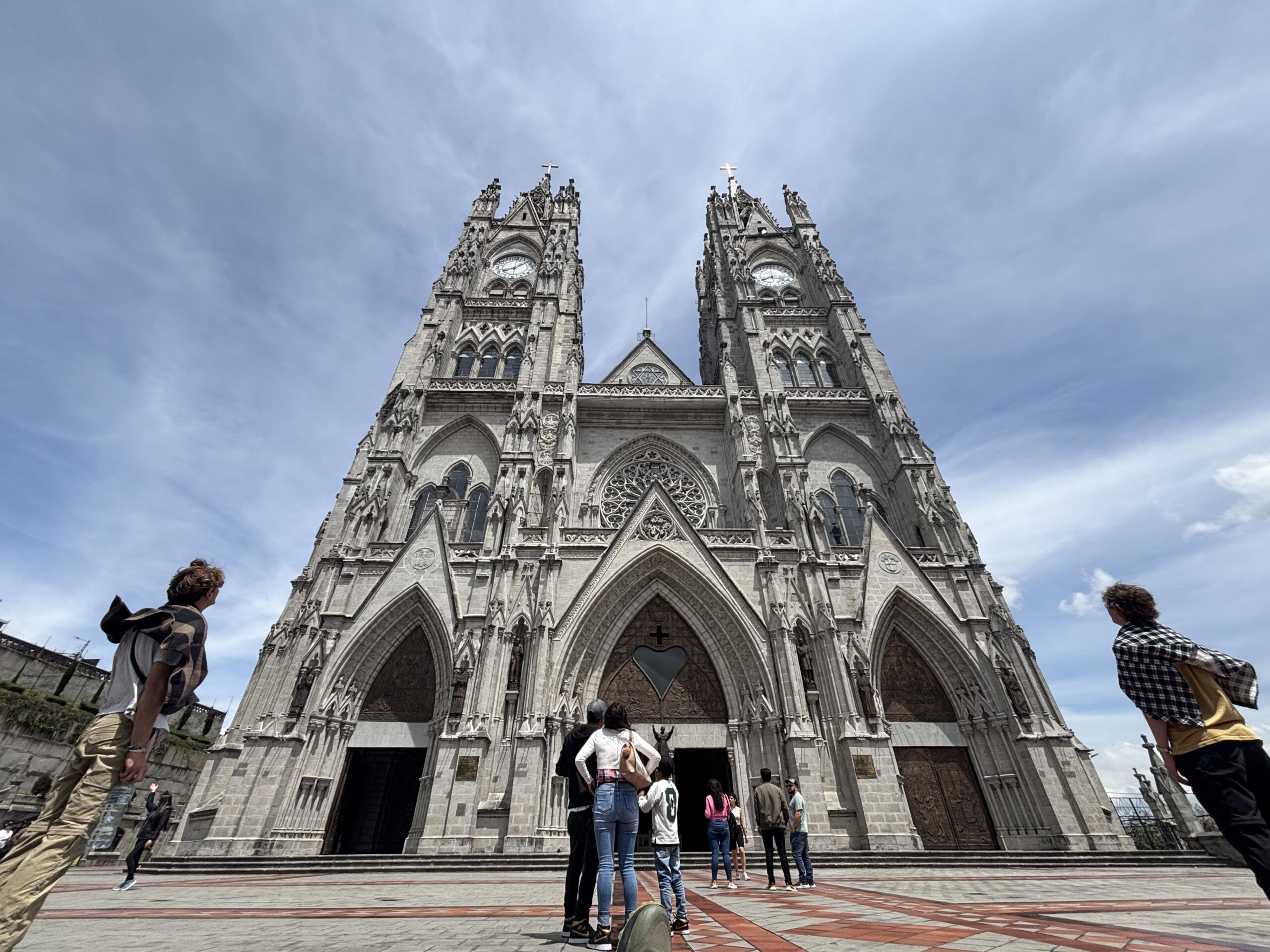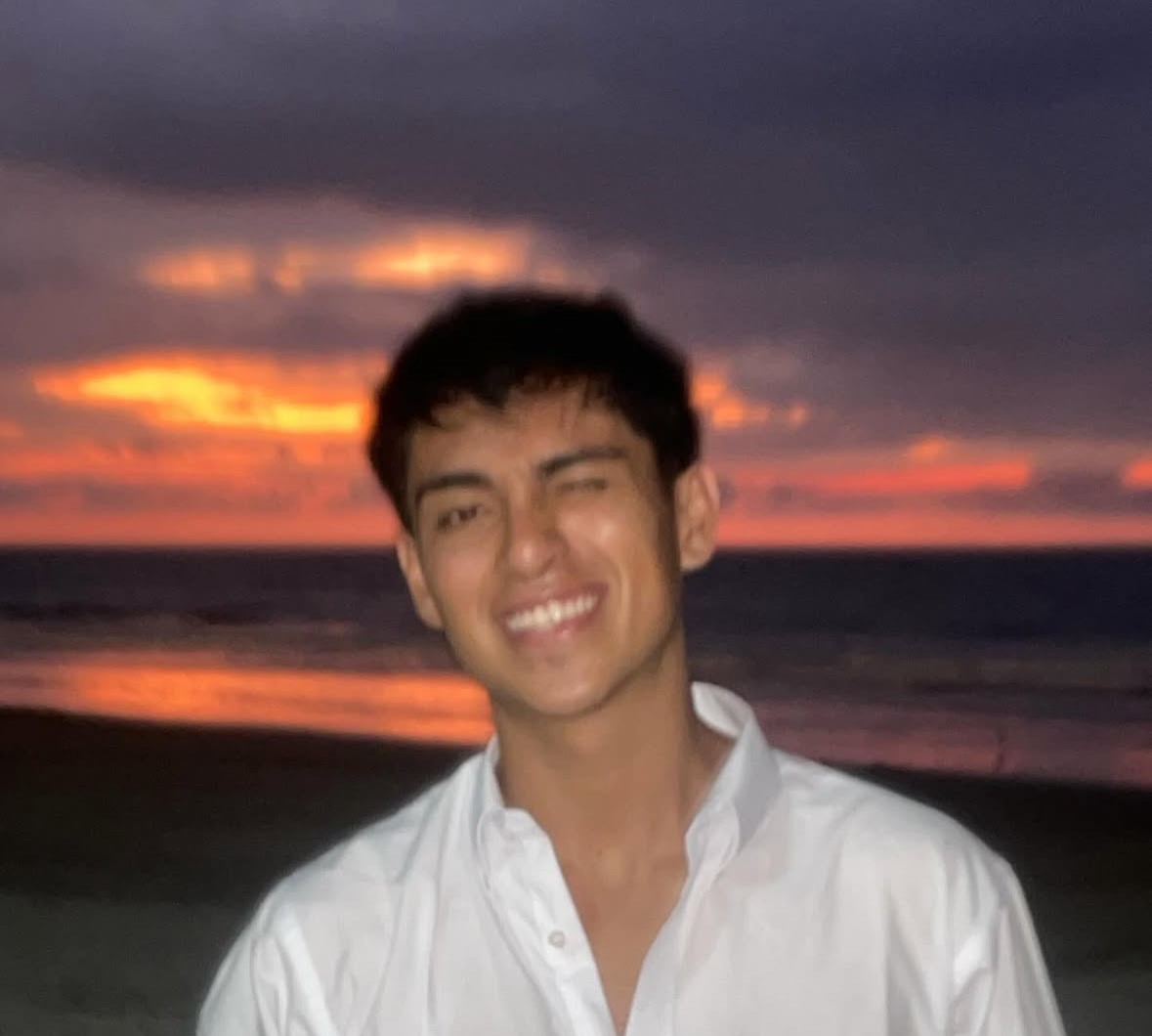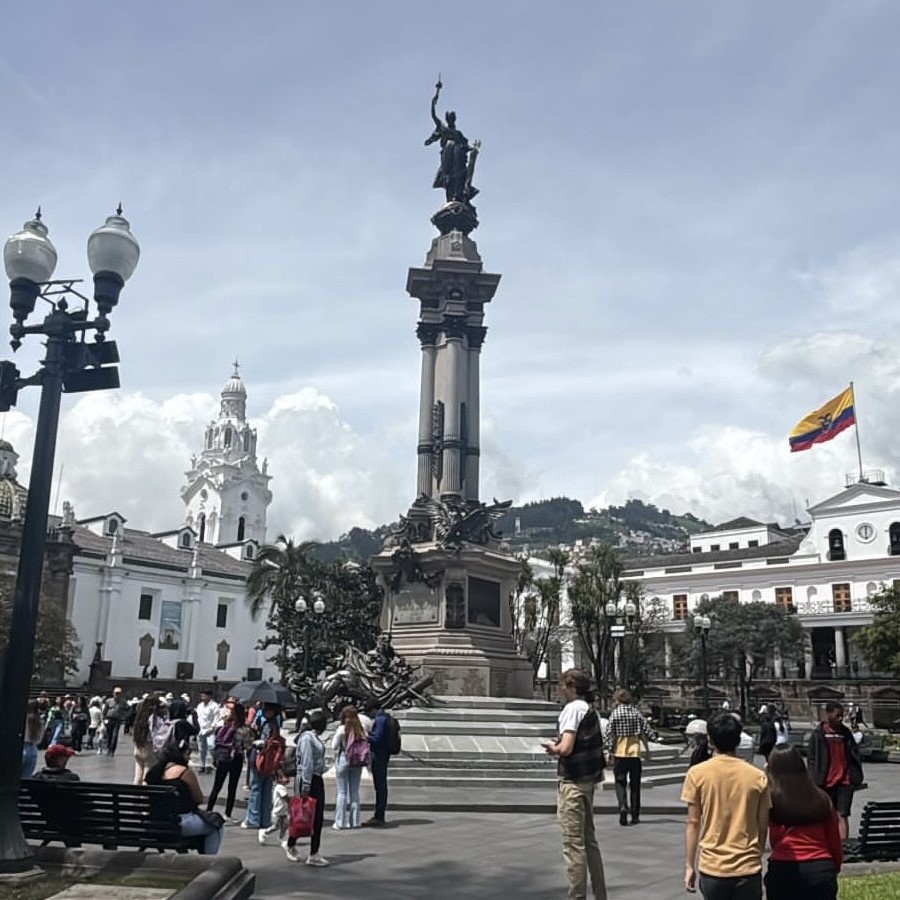
View of Quito from Secret Garden Hostel.
Ecuador is a country blessed with some of the most breathtaking landscapes I’ve ever encountered. As soon as you cross the border from Colombia, you’re immediately met with a stunning array of mountain ranges and towering volcanoes, weaving through lush, green valleys. This scenic route often leads to Quito, Ecuador’s capital. The city is a sprawling collection of districts, each nestled beneath the watchful eyes of mountains that surround it on all sides.
But it’s not just the dramatic landscapes that make Quito a must-visit. As you make your way toward the city center, Quito bursts to life with vibrant colors—blue, green, red, yellow—every building seems to be painted in bold hues, creating a cityscape that feels alive. Quito’s significance goes beyond its aesthetic appeal. Rich in history, the city was once a center of Inca culture and played a pivotal role in the early movements for independence. In 1809, Quito was the site of the “First Cry of Independence,” one of the first major revolts against Spanish colonial rule in Latin America. This uprising marked a crucial moment in the region’s long struggle for independence from Spain.
Quito’s allure doesn’t end within the city limits. Just a short drive away, you’ll find Otavalo, Quilotoa Lake, Cotopaxi National Park, and Mindo—each destination offering its own unique charm and plenty of opportunities to fill up your camera roll with unforgettable memories.

Basilica of the National Vow church in Quito.
This brings me to Andre Cevallos. I actually first met Andre in Medellín, Colombia—a fact some might call cheating, but I saw it as an opportunity. Andre grew up in Quito, and I knew I needed to experience the city firsthand before writing this story.
Andre is a passionate and driven guy, currently pursuing a degree in Mechanical Engineering in Quito. While he dreams of taking his talents abroad one day, his deep pride in being Ecuadorian and a member of the Quito community is undeniable. During our conversation, Andre shared invaluable insights that would shape my experience when I finally visited the city. So, here’s Andre’s story, unfiltered and told from the perspective of someone who has seen much of the world yet still holds an immense pride in his hometown.

André Cavellos. Photo Provided by André.�
André Cavellos Interview Transcript
Zach: So I’ll just get you to state your name and where you live.
André:Okay, so I amAndré Ceballos. I am from Quito, Ecuador, and I’m living in Quito.
Zach: And how long have you lived in Quito for?
I live in Quito all my life, since I was a baby. So yeah, I live here all my life.
Zach: And so what can you tell me about what it was like growing up in Quito? Like, you know, what was your experience?
André:It is cool. Like in high school, I have a lot of friends who grew up in like other parts of the world, like French people, people from Belgium. It’s different. It’s like you are very near to people that don’t have a lot of money in Quito. But yeah, like you have a lot of good culture from the Los Andes. So you see a lot of aborigine people in Quito. So that makes part of my identity too, or my culture. In Ecuador, almost all the people are very proud of being Ecuadorian. So that’s a big feeling. Keep the color. And yeah, I don’t know how anything else I can say to you. Like I think it’s pretty cool to be in Quito. Pretty cool. Yeah. Yeah, it’s a good sense of pride, it sounds like. Yeah, a lot of people have that.
Zach: Um, and so growing up, what was your favorite part? Like, you know, the culture you mentioned, like, you know, there’s a lot of pride. But what was, I guess, something that was a highlight of your childhood or something growing up?
André:My favorite part in Quito for sure is the centro histórico. So I’d like to go in our part of the city. And is it because like I love history? So that’s a very historic place and everything is like very good main thing, you know? So you can see like how was the architecture back in the times. Also, it is principally Spanish, but all the churches and all the colonial stuff was made over Aboriginal houses, so you can see them too. And like also Quito is called la Luz de América because it was where in America at the first place we wanted to get independent from Spanish. So it was in Quito. So, you know, you know a lot of that important historical context of being in Quito. And also like, you know, it’s very beautiful. Like you can eat there. It’s a very romantic place too. You see a lot of people like Aboriginal people, people from Quito, from the coast.Yeah, so I think that’s my favorite part of Quito.

Plaza de la Independenica
Zach: And so, what are your goals? I guess down the line, what do you hope to achieve? Whether that’s, you know, in the next two years or the next 50 years, you know, what do you want to achieve?
André:Okay, so in the next something not that far, yeah, I want to, well, first graduate. I hope that is in May. I graduate in May. After that, I want to go to the United States, get a lot of experience in mechanical engineering, and principally like in countries like the United States or Europe because it has more technology than South America. But then my goal in life, I don’t want to be unemployed all my life, so I want to put myself to create an enterprise or do something like that in mechanical things. And yeah, that’s my plan for next year.In other economical ways in family, I don’t want a girlfriend right now. Like I think it may ruin my plans, but…You want a lot of self-development. Yes. And then I hope to be married like at 30, 30 years. And yeah, I would love to have kids when I’m going to get like 33, 34. So yeah, I think those are my plans in life.
Zach: So this is not like a semi hard-hitting question, but you know, it could be as big and as small as you want, but what is the biggest issue that you see in the world today?
André: Oh, that’s a good question. I think like growing up in this part of the world, I see a lot of differences in power, you know. Everyone does not have the same opportunities. Even if you work really hard, it’s like difficult to get on top in this part of the world, you know. So I think that’s the problem. I don’t know how to explain it, but like that difference between those people. Like you see people who have a lot of money and is like all his life having, and you can see a kid selling like water in the street, and he works more than other people, but he doesn’t get as much. And maybe in all his life, he won’t get as much as other people. So, but I think that problem is basically because I think in this part of the world, people are very separated by hate, for example, in political ideas, also by your skin color, you know, in Ecuador. If you’re white, you generally have money. If you’re like very aboriginal, you don’t have that money. So yeah, I think that’s the principal problem in the world.
Zach: Big wealth disparity. You see it all over the world, and I guess, yeah, some of the countries would definitely be hit a lot harder. But thank you so much. I appreciate the answers today.
André: I hope you… Yeah, I really enjoyed it. I really enjoyed it. It was interesting. Very interesting.
Thank you so much.